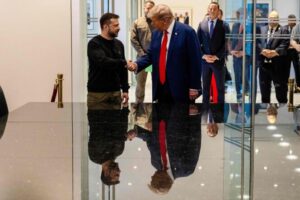It’s Simple: He’s an Idiot
Sunday, September 28th, 2025By Bob Gaydos
Sometimes, we humans can make things more complicated than they really are. For example, we can drive ourselves nuts trying to figure out why someone does or says the things he says or does.
Yes, obviously I’m talking about Trump.
It has become a daily preoccupation. From declaring war on Venezuelan fishermen or Los Angeles or Portland to windmills and Tylenol and the entire United Nations. One thousand percent tariffs? Buying Greenland? Ignoring the First Amendment? Telling King Charles to adopt the moniker Charles the Conqueror? All in a day’s work for Donald. Why? Why? Why?
For a lot of us, it’s crazy making. But it doesn’t have to be.
Trump gives us clues all the time. In fact there’s a meme (of course) that sums it up nicely. It consists of three quotes from Trump:
“I love the poorly educated.”
-Trump about MAGAs 2/24/16
“I don’t care about you. I just want your vote.”
– Trump to MAGAs 6/9/24
“Smart people don’t like me, you know?”
– Trump 9/14/25
Umm, yes, we know. But why?
Society has a way of coming up with ways to explain the seeming unexplainable. The most famous perhaps is Occam’s Razor. Attributed to William of Ockham, a 14th-century English philosopher and theologian, it is explained as “Entities must not be multiplied beyond necessity.” Popularly, the principle is paraphrased as “of two competing theories, the simpler explanation of an entity is to be preferred.”
When applied to everyday life, Occam’s razor encourages choosing the simplest explanation or solution to a problem, especially when multiple options exist with similar explanatory power. Instead of overcomplicating things, it suggests that the explanation requiring the fewest assumptions is likely the correct one.
A lot of anonymous recovery groups have an even more basic suggestion to help newer members trying to figure out how things work: The acronym KISS, or “Keep it simple, stupid.”
So, Trump?
His biographer, Michael Wolff, who had considerable access to Trump, says he found himself wondering the same thing: Why does he say the things he says, often oblivious to the situation or actual facts?
Wolff says he asked Sam Nunberg, a close adviser to Trump in his early political career, about the kind of president Trump might be. Wolff thought Trump might be a bit unpredictable.
Wolff says Nunberg replied, ‘‘You don’t get it, do you? He’s an idiot!’’
And at that moment, Occam’s razor and the KISS principle both kicked in for Wolff: “It all came clear to me because Trump is, in very classic terms, an idiot.”
Duh! Of course.
And part of him instinctively knows it. That third quote in the meme: “Smart people don’t like me, you know?” wasn’t said to a meeting of Mensa. It was addressed to his MAGA followers. You know, the ones of which he said,”I love the poorly educated” and “I don’t care about you. I just want your vote.” In some respects, Trump apparently understands the KISS principle.
So, based on the opinions of two men who had much closer contact with him than most people, I’m applying Occam’s Razor to Trump, who today faces a 24-hour deadline for total shutdown of the federal government, even though his party controls the executive, legislative and judicial branches of government.
He’s in charge of all of it, yet it’s about to shut down. Trump blew off a meeting with congressional leaders last week to try to avoid the shutdown. Now he’s down to the final hours.
Why? Well, obviously, he’s an idiot.
Now that that’s settled, I have to start figuring out how to apply Occam‘s razor to all the people who still love Trump and voted for him, twice.
KISS.
###
PS: Having deduced that Trump is an idiot does not preclude the fact that Trump is also a fascist and a pedophile. Occam’s Razor says all three are possible.

